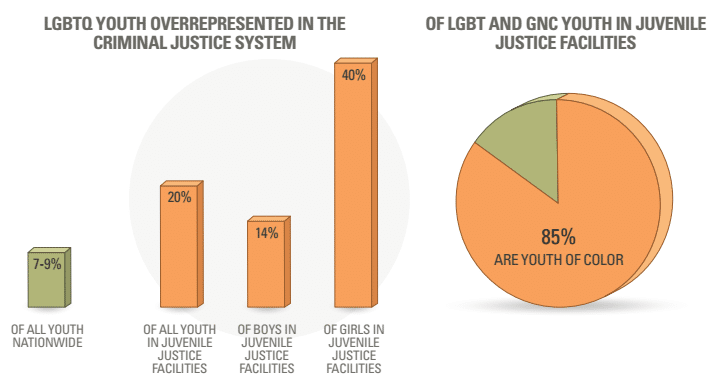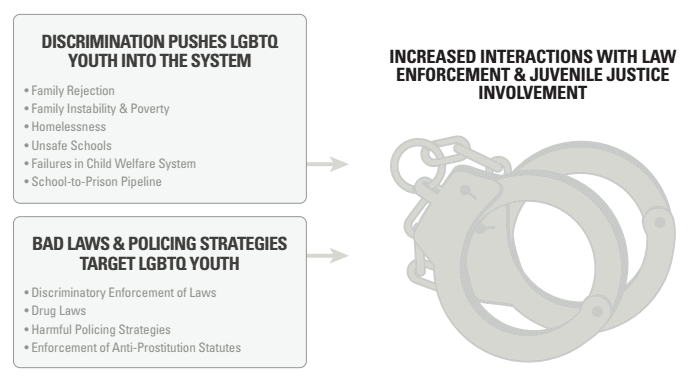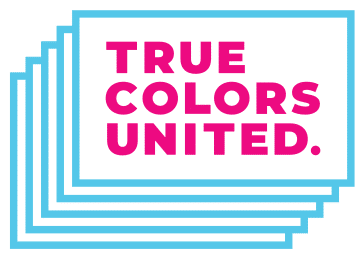
According to a new report, lesbian, gay, bisexual, transgender, and queer (LGBTQ) youth are more likely to face arrest, prosecution, and mistreatment within the juvenile justice system. Among the report’s most alarming findings is that the percentage of LGBTQ youth in juvenile detention is double that of LGBT youth in the general population; 20% of youth in juvenile justice facilities identify as LGBTQ or gender nonconforming compared to 7-9% of youth in general. The findings are stark, but research like this is vital as the True Colors Fund and our partner organizations continue our work to create a better world for LGBTQ young people.
Unjust: How the Broken Juvenile and Criminal Justice Systems Fail LGBTQ Youth is the product of a group of organizations working on issues including LGBTQ equality, homelessness prevention, education, criminal justice reform, and more. We’re proud to have contributed findings from our work, and proud of 2015 True Fellow Kristopher Sharp for sharing his own personal insight and ideas to this report.
“This report confirms once and for all what many of us have known for some time: LGBTQ young people are grossly overrepresented in the juvenile justice system, and it’s no coincidence. We live in a society where discrimination and stigma too often lead to criminalization and mistreatment at the hands of law enforcement,” said Ineke Mushovic, Executive Director of the Movement Advancement Project.
The report also explores the widespread causes of the overrepresentation and documents the disparate—and often exceedingly harsh—treatment of LGBTQ youth by law enforcement, courts and detention facilities. The new report is a companion to a broader report released earlier this year, Unjust: How the Broken Criminal Justice System Fails LGBT People.
Why Are LGBTQ Youth Overrepresented in the System?
The Unjust report highlights several factors in the overrepresentation of LGBTQ young people in the juvenile justice system. They include:
- Pervasive anti-LGBT discrimination and stigma. LGBTQ youth are uniquely vulnerable to family rejection and mistreatment in child welfare and foster placements. More than half (56%) of lesbian and gay youth in New York City’s child welfare system said they’d stayed on the streets because their foster care placement wasn’t safe. These experiences dramatically increase the chances that LGBTQ youth will have interactions with law and high school students reported feeling unsafe at school because of their sexual orientation, and four in ten (39%) students felt unsafe because of their gender identity or expression. LGBTQ students, particularly students of color, are also among the groups of students who are more likely to be suspended, expelled or otherwise removed from school settings—often for relatively minor offenses—in scenarios that are now widely known as the “school-to-prison pipeline.”
- Discriminatory enforcement of laws. Researchers find that LGBTQ young people are at increased risk for criminalization for sexual behavior in comparison to heterosexual youth, even when all other circumstances are the same (for example, a gay youth is more likely to be disciplined for public displays of affection than a heterosexual youth). Research finds that LGBT youth also pay a particularly high price for “quality of life” policing that includes crackdowns on minor crimes and “stop and frisk” policies. These interactions with law enforcement are frequently unsafe for LGBT youth; in New Orleans, 59% of transgender youth reported being asked for sexual favors by police.
“Existing policies often provide little promise of equal treatment under law for LGBTQ young people. Our research shows they are more likely to have negative and discriminatory interactions with teachers, foster parents, the child welfare system and even law enforcement officers,” said Laura E. Durso, Senior Director of the LGBT Research and Communications Project at the of the Center for American Progress, which coauthored the report. “As a result, LGBT young people are dramatically overrepresented in the criminal justice system. It is long past time we looked at the way the education, child welfare and law enforcement systems interact and continuously fail to provide safety and equality of opportunity these young people.”

LGBTQ Youth Face Discrimination and Abuse in the System
The report also paints a comprehensive portrait of how LGBTQ youth are unfairly treated once they enter the juvenile justice system. The following are among the problems it documents:
- Bias in pretrial release and court proceedings. LGBTQ young people face disadvantages in the arraignment process and are more likely to be placed in a facility to await trial, rather than being sent home. 40% of LGBTQ youth in California were held while awaiting adjudication for running away compared to just 13% of non-LGBTQ youth. They also report negative experiences in the court system; 44% of LGBTQ youth engaged in survival sex in New York City reported negative experiences with the court system.
- Mistreatment in juvenile justice facilities. Surveys show that LGBT youth are particularly vulnerable to sexual assault and abuse by staff and other youth in juvenile justice facilities. Aggravating the problem is the fact that transgender youth frequently are placed in facilities according to the sex on their birth certificate rather than the gender they live everyday.
“LGBTQ young people are facing unacceptable levels of mistreatment, harassment and violence in the juvenile and criminal justice systems,” said Shannon Wilber, Youth Project Director of the National Center for Lesbian Rights. “Their experiences in these systems are a huge threat to their lives and life chances, and we are doing far too little to prepare them for a healthy and productive life after release.”
The Unjust report includes numerous stories about people, organizations and juvenile justice institutions that are advancing positive changes to improve conditions and outcomes for LGBTQ youth. It also includes a series of recommendations for ensuring fairer treatment of LGBTQ young people in families, schools, communities and throughout the juvenile and criminal justice systems.
Check out the full report here.
ABOUT THE CO-AUTHORS
Movement Advancement Project (MAP) is an independent think tank that provides rigorous research, insight, and analysis that help speed equality for LGBT people. MAP works collaboratively with LGBT organizations, advocates and funders, providing information, analysis and resources that help coordinate and strengthen efforts for maximum impact. MAP’s policy research informs the public and policymakers about the legal and policy needs of LGBT people and their families.
Center for American Progress (CAP) is a think tank dedicated to improving the lives of Americans through ideas and action. CAP combines bold policy ideas with a modern communications platform to help shape the national debate. CAP is designed to provide long-term leadership and support to the progressive movement. CAP’s policy experts cover a wide range of issue areas, and often work across disciplines to tackle complex, interrelated issues such as national security, energy, and climate change.
REPORT PARTNERS
Advancement Project
The Equity Project
Forward Together
GLSEN
GSA Network
Human Rights Campaign and Human Rights Campaign Foundation
JustLeadershipUSA
National LGBTQ Task Force
True Colors Fund
Youth First
